Hamed Hojatian
SAGE-HB: Swift Adaptation and Generalization in Massive MIMO Hybrid Beamforming
Jan 19, 2024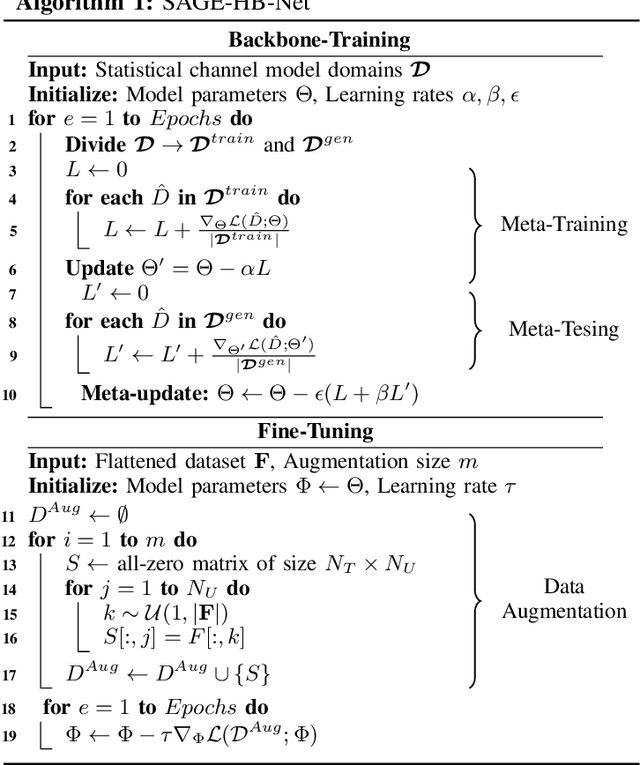



Abstract:Deep learning (DL)-based solutions have emerged as promising candidates for beamforming in massive Multiple-Input Multiple-Output (mMIMO) systems. Nevertheless, it remains challenging to seamlessly adapt these solutions to practical deployment scenarios, typically necessitating extensive data for fine-tuning while grappling with domain adaptation and generalization issues. In response, we propose a novel approach combining Meta-Learning Domain Generalization (MLDG) with novel data augmentation techniques during fine-tuning. This approach not only accelerates adaptation to new channel environments but also significantly reduces the data requirements for fine-tuning, thereby enhancing the practicality and efficiency of DL-based mMIMO systems. The proposed approach is validated by simulating the performance of a backbone model when deployed in a new channel environment, and with different antenna configurations, path loss, and base station height parameters. Our proposed approach demonstrates superior zero-shot performance compared to existing methods and also achieves near-optimal performance with significantly fewer fine-tuning data samples.
Learning Energy-Efficient Hardware Configurations for Massive MIMO Beamforming
Aug 11, 2023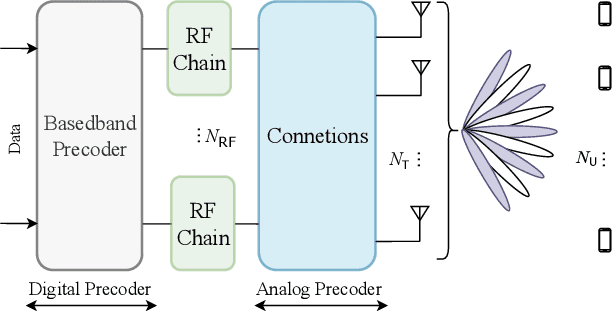

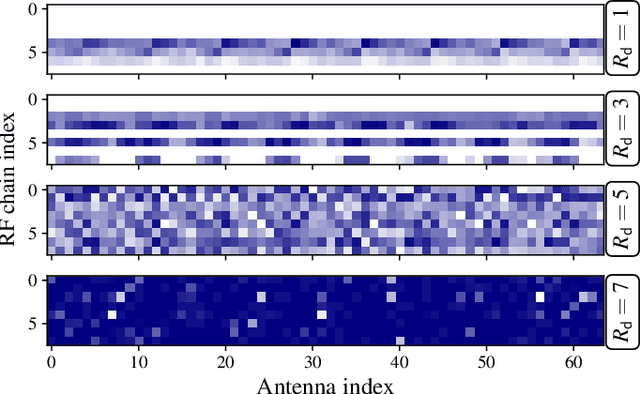
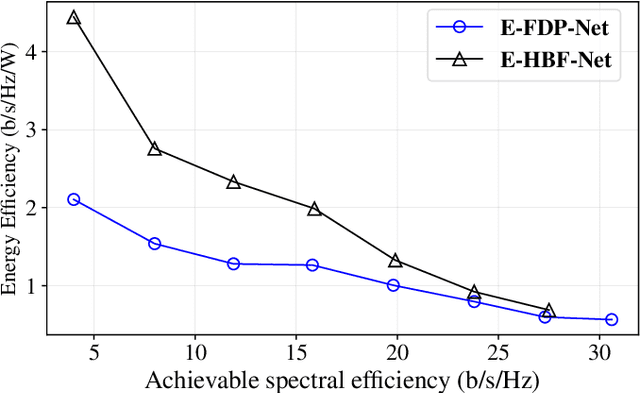
Abstract:Hybrid beamforming (HBF) and antenna selection are promising techniques for improving the energy efficiency~(EE) of massive multiple-input multiple-output~(mMIMO) systems. However, the transmitter architecture may contain several parameters that need to be optimized, such as the power allocated to the antennas and the connections between the antennas and the radio frequency chains. Therefore, finding the optimal transmitter architecture requires solving a non-convex mixed integer problem in a large search space. In this paper, we consider the problem of maximizing the EE of fully digital precoder~(FDP) and hybrid beamforming~(HBF) transmitters. First, we propose an energy model for different beamforming structures. Then, based on the proposed energy model, we develop an unsupervised deep learning method to maximize the EE by designing the transmitter configuration for FDP and HBF. The proposed deep neural networks can provide different trade-offs between spectral efficiency and energy consumption while adapting to different numbers of active users. Finally, to ensure that the proposed method can be implemented in practice, we investigate the ability of the model to be trained exclusively using imperfect channel state information~(CSI), both for the input to the deep learning model and for the calculation of the loss function. Simulation results show that the proposed solutions can outperform conventional methods in terms of EE while being trained with imperfect CSI. Furthermore, we show that the proposed solutions are less complex and more robust to noise than conventional methods.
Flexible Unsupervised Learning for Massive MIMO Subarray Hybrid Beamforming
Aug 10, 2022

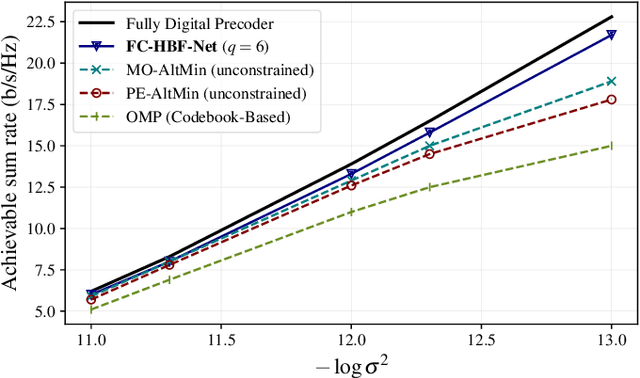
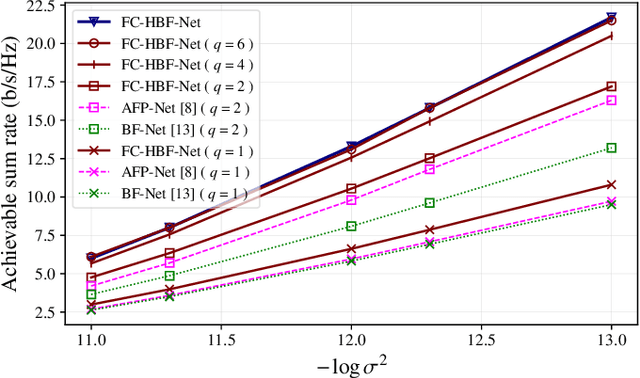
Abstract:Hybrid beamforming is a promising technology to improve the energy efficiency of massive MIMO systems. In particular, subarray hybrid beamforming can further decrease power consumption by reducing the number of phase-shifters. However, designing the hybrid beamforming vectors is a complex task due to the discrete nature of the subarray connections and the phase-shift amounts. Finding the optimal connections between RF chains and antennas requires solving a non-convex problem in a large search space. In addition, conventional solutions assume that perfect CSI is available, which is not the case in practical systems. Therefore, we propose a novel unsupervised learning approach to design the hybrid beamforming for any subarray structure while supporting quantized phase-shifters and noisy CSI. One major feature of the proposed architecture is that no beamforming codebook is required, and the neural network is trained to take into account the phase-shifter quantization. Simulation results show that the proposed deep learning solutions can achieve higher sum-rates than existing methods.
Limited-Fronthaul Cell-Free Hybrid Beamforming with Distributed Deep Neural Network
Jun 30, 2021

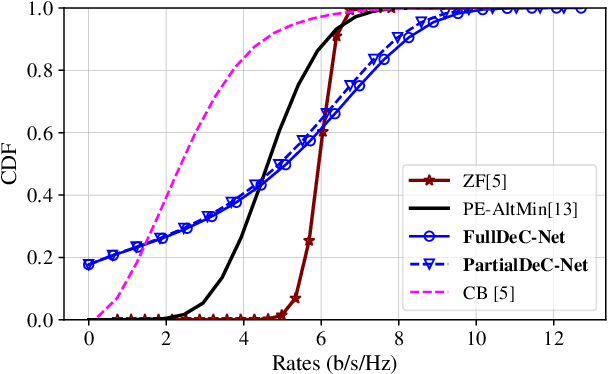

Abstract:Cell-free massive MIMO (CF-mMIMO) systems represent a promising approach to increase the spectral efficiency of wireless communication systems. However, near-optimal solutions require a large amount of signaling exchange between access points (APs) and the network controller (NC). In addition, the use of hybrid beamforming in each AP reduces the number of power hungry RF chains, but imposes a large computational complexity to find near-optimal precoders. In this letter, we propose two unsupervised deep neural networks (DNN) architectures, fully and partially distributed, that can perform coordinated hybrid beamforming with zero or limited communication overhead between APs and NC, while achieving near-optimal sum-rate with a reduced computational complexity compared to conventional near-optimal solutions.
Unsupervised Deep Learning for Massive MIMO Hybrid Beamforming
Jul 02, 2020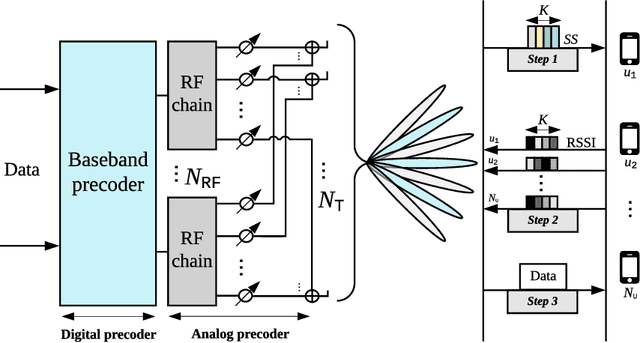
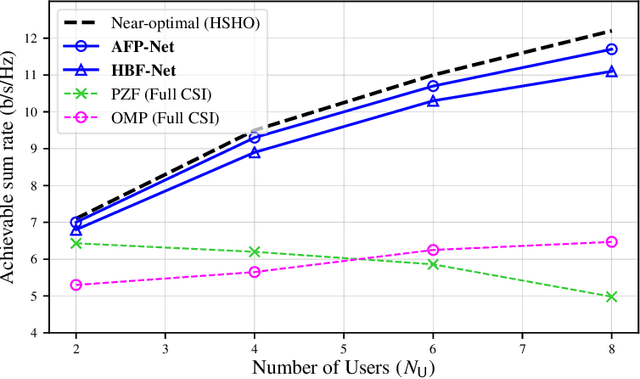
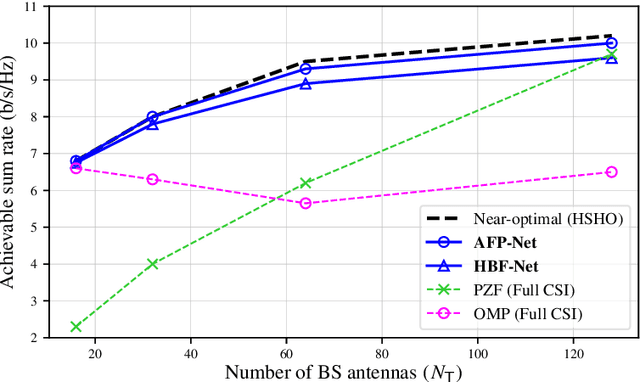
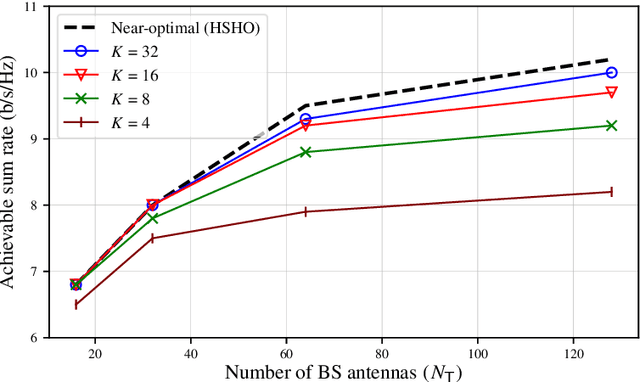
Abstract:Hybrid beamforming is a promising technique to reduce the complexity and cost of massive multiple-input multiple-output (MIMO) systems while providing high data rate. However, the hybrid precoder design is a challenging task requiring channel state information (CSI) feedback and solving a complex optimization problem. This paper proposes a novel RSSI-based unsupervised deep learning method to design the hybrid beamforming in massive MIMO systems. Furthermore, we propose i) a method to design the synchronization signal (SS) in initial access (IA); and ii) a method to design the codebook for the analog precoder. We also evaluate the system performance through a realistic channel model in various scenarios. We show that the proposed method not only greatly increases the spectral efficiency especially in frequency-division duplex (FDD) communication by using partial CSI feedback, but also has near-optimal sum-rate and outperforms other state-of-the-art full-CSI solutions.
RSSI-Based Hybrid Beamforming Design with Deep Learning
Mar 12, 2020
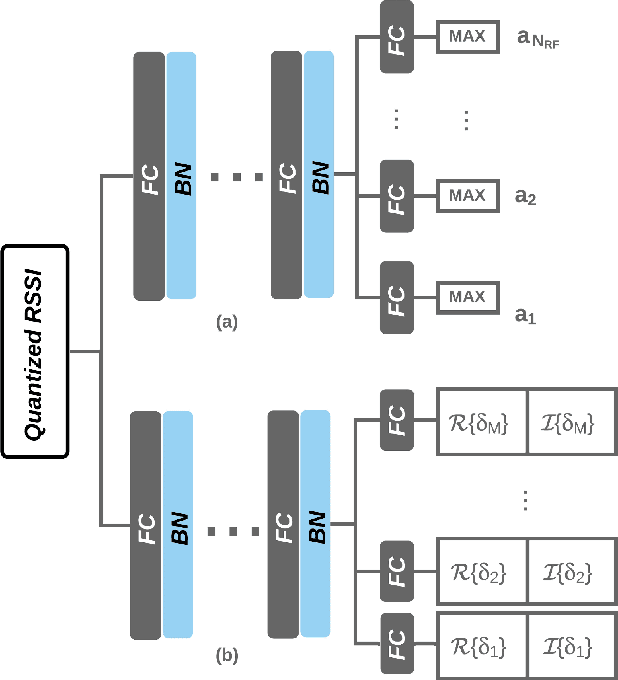
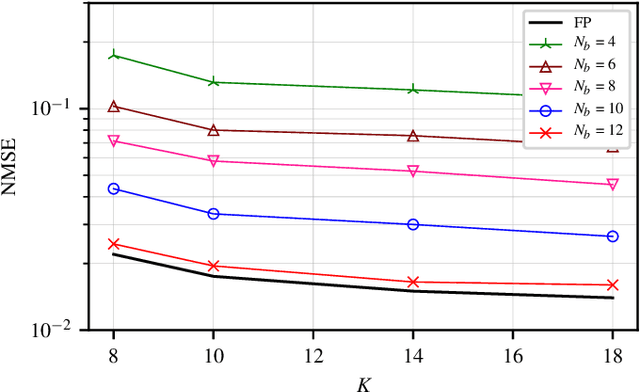
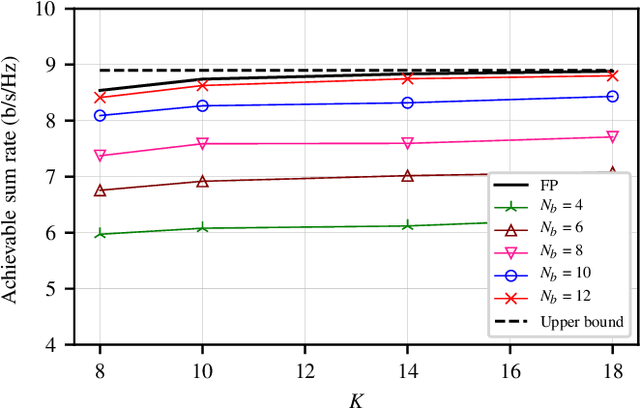
Abstract:Hybrid beamforming is a promising technology for 5G millimetre-wave communications. However, its implementation is challenging in practical multiple-input multiple-output (MIMO) systems because non-convex optimization problems have to be solved, introducing additional latency and energy consumption. In addition, the channel-state information (CSI) must be either estimated from pilot signals or fed back through dedicated channels, introducing a large signaling overhead. In this paper, a hybrid precoder is designed based only on received signal strength indicator (RSSI) feedback from each user. A deep learning method is proposed to perform the associated optimization with reasonable complexity. Results demonstrate that the obtained sum-rates are very close to the ones obtained with full-CSI optimal but complex solutions. Finally, the proposed solution allows to greatly increase the spectral efficiency of the system when compared to existing techniques, as minimal CSI feedback is required.
 Add to Chrome
Add to Chrome Add to Firefox
Add to Firefox Add to Edge
Add to Edge